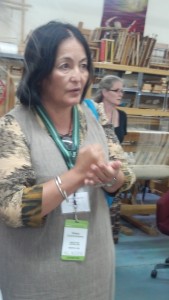I will still be processing all that I learned in the invitational “Local to Global – Folk Art as a Catalyst for Social Change” held at Espanola Valley Fiber Arts Center and at Santa Fe’s International Folk Art Festival for weeks and months to come. My vision of the world of creativity, felting and networking has been expanded exponentially. One of the first points of clarity came out of my engagements at the EVFAC gathering with a woman who has a long and storied history in felt making.

Chochunbaeva Dinara‘s title on her business card is “Direktor of the Central Asia Craft Support ‘s Resource Center” in Kyrgyzstan. In this role, she brings resources and opportunities to her country’s crafts people and works to improve their products, learn business skills and sell handcrafted items. At our retreat, she was an articulate leader in this group of leaders, identifying the many cross cultural challenges facing handcrafters and artisans around the world. She urged all of us present to continue this important dialogue and look to create enduring networks that straddle nations, cultures and economies.
Kyrgyzstan is a fascinating country that separated from the Soviet Union in 1991. The history of the Kyrgyz tribe dates back to the 17th Century. Its recent history, both within the Soviet Union and since its separation, has been marked by political, economic and cultural unrest and instability.
A central and enduring aspect of the history of the Kyrgyz is feltmaking. From felted dwelling places called yurts to culturally important felted clothing to symbolic and religious imagery and art made from felt, feltmaking is important to both the past and the future of this region.
Dinara, however, is much more than the title on her business card. Dinara is a highly talented traditional felt maker in her own right, an international leader in recognizing and promoting traditional crafts from her own country and around the world through the UNESCO Awards of Excellence, and many other organizations internationally. Articulate and passionate about the roles of creative crafts throughout history, she is also a very learned and recognized scholar and educator about felt, its importance in the past, and its role in the future of her region and the world.
A chance encounter? I don’t think so. Dinara asked me to bring her some samples of Whispirit fabric, which I did on Saturday. I bought a beautiful scarf at her UNESCO booth, which has elements of design and felting techniques I would like to incorporate into Whispirit designs for this fall. I hope there is a lot more to come.
Sandy
